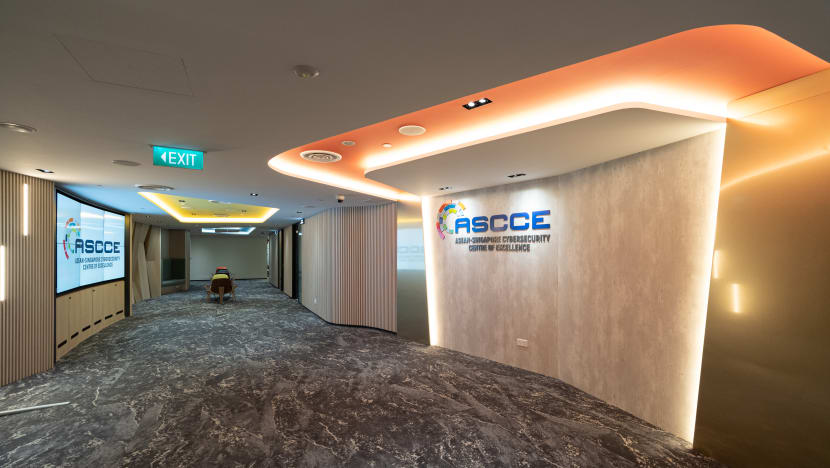New regional cybersecurity training centre opens in Singapore

The ASEAN-Singapore Cybersecurity Centre of Excellence at North Bridge Road will see ASEAN member states work together to conduct research, share knowledge and train to respond to cyber threats. (Photo: Cyber Security Agency of Singapore)
SINGAPORE: A new regional cybersecurity training centre that will see ASEAN member states work together to conduct research, share knowledge and train to respond to cyber threats, opened on Wednesday (Oct 6), three years after it was first announced.
Located in the city centre at North Bridge Road, the ASEAN-Singapore Cybersecurity Centre of Excellence (ASCCE) has two training labs that can hold up to 100 participants, and other conference rooms and amenities to facilitate capacity building efforts, said the Cyber Security Agency of Singapore (CSA) in a media release on Wednesday.
First announced in 2018, the ASCCE is an extension of the ASEAN Cyber Capacity Programme (ACCP).
Then-Communications and Information Minister S Iswaran had said that the centre would spend S$30 million over five years to help ASEAN member states develop their cybersecurity capabilities.
The centre will focus on conducting research and providing training in areas including international law, cyber strategy, and other cybersecurity policy issues, said CSA.
It will also provide technical training and facilitate the exchange of open-source cyber threat and attack-related information and best practices.
Virtual cyber defence training and exercises will also be conducted, CSA added.
These will be designed and delivered in collaboration with ASEAN member states, ASEAN dialogue partners and other international partners, with the help of top cyber experts and trainers.
To date, more than 30 programmes have been conducted by the ASCCE and ACCP, with more than 900 senior officials from ASEAN and other states attending the sessions.
STRENGTHENING THE REGION'S COLLECTIVE CYBERSECURITY
Speaking at the opening ceremony of the 6th ASEAN ministerial conference on cybersecurity (AMCC), Communications and Information Minister Josephine Teo stressed the increasing importance of strengthening the region’s collective cybersecurity, with the cyber threat landscape significantly changing.
“Supply chain and ransomware attacks are increasing in frequency, scale, and impact,” she said, pointing to high-profile attacks such as the SolarWinds breach and the Kaseya breach which affected thousands of businesses and organisations.
“(These examples) also highlight the need for international cooperation to build consensus on the rules, norms, principles and standards governing cyberspace,” added Mrs Teo, who is also Minister-in-charge of Smart Nation and Cybersecurity.
“Such efforts will help to ensure that states behave responsibly in their use of information and communications technologies (ICTs), so we can achieve an open, secure, and interoperable ICT environment. In doing so, we can also strengthen the rules-based multilateral order.”
On this front, ASEAN has made progress with the regional organisation adapting UN’s recommendations to its unique operating environment, said Mrs Teo, who was speaking at her first AMCC since assuming her new portfolio as Communications and Information Minister in May.
“We are making further progress through the development of the ASEAN Regional Action Plan, which will guide regional norms implementation. To this end, Malaysia and Singapore recently co-organised a workshop with our ASEAN colleagues,” she said, adding that she looked forward to the endorsement of the plan at the ASEAN Digital Ministers’ Meeting in December.
But with malicious cyber threat actors continuing to enhance their modus operandi to bypass defences, said Mrs Teo, ASEAN member states cannot afford to lose momentum. She emphasised the need to work on areas including cyber strategy, cyber ops-tech collaboration, and cyber capacity building.
She said it was timely to update the ASEAN Cybersecurity Cooperation Strategy to address evolving challenges.
Launched in 2017, the ASEAN Cybersecurity Cooperation Strategy provided a roadmap for regional cooperation to achieve a safe and secure regional cyberspace.
“Singapore is happy to take the lead and we will discuss this as one of the agenda items later. The updated Strategy places stronger focus on initiatives to support the establishment of the rules-based order in cyberspace and ASEAN’s Digital Masterplan 2025,” she said.













